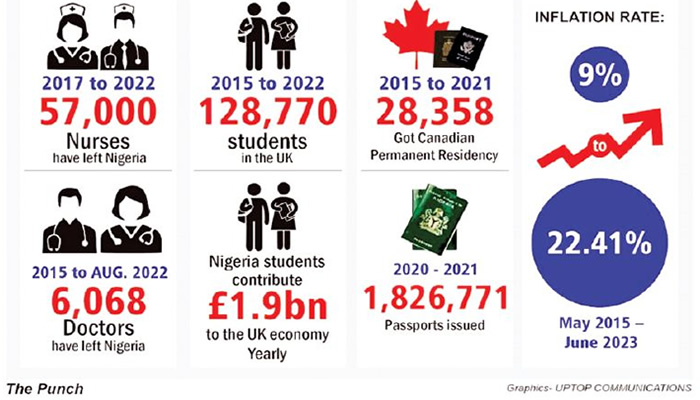
Cost of living: More Nigerians may join Japa train as hardship worsens
Strong indications have emerged more Nigerians may relocate from the country in 2023 and beyond as the nation’s socio-economic conditions worsen, and hope remains bleak.
This came on the heels of the recent removal of fuel subsidy, further depreciation of the naira, impending increase in electricity tariff, and the introduction of Value Added Tax on diesel amid an already battered economy.
The Nigerian economy has been exposed to numerous economic shocks in recent times and this has led to a surge in the number of Nigerians leaving the shores of the country in search of greener pastures overseas.
Multiple travel agency officials confirmed to The PUNCH on Friday that ticket booking showed several Nigerians would leave the country during this summer.
According to them, several intending travelers are relocating to London, Canada and the United States of America via study route while others are leaving to take up new jobs in the Western countries.
The National Chairman of the National Association of Nigerian Travel Agents, Susan Akporiaye, confirmed to The PUNCH that there has been a massive increase in the number of Nigerians travelling outside the country lately.
According to her, most travel bookings have ranged from Nigerians looking to relocate for educational to professional reasons.
Susan said, “A lot of countries, especially Canada, have made it clear that they need more hands. There is a crisis in the UK, where they don’t have enough hands to take care of the elderly. So, they opened up that they want caregivers. So, there is a massive movement in that angle, for caregiving. So this has contributed to a large number of people who want to migrate.”
The Founder of Travels N Tours, Biola Abimbola, said more people were leaving Nigeria than ever before.
He said, “Yes. More people want to travel now because the state of the economy is bad and the youths are looking for where there are opportunities, especially the middle class. The problem is that more people are leaving than ever before.”
Relocation plans
One of the Nigerians seeking to relocate abroad, who spoke to The PUNCH, said, “Not having a job is what is motivating my Japa. I am leaving for a better chance of finding work.”
The lady, who only gave her name as Doyin because she didn’t want her name in print, stated that she was set to proceed to the United States later this month to find better work and improve her life.
She added, “The day I went for my visa interview, there were about a hundred people there.”
A customer care representative with Sterling Bank, Chiamaka Steven, who is set to move to the United Kingdom by the end of the year told The PUNCH that the decision to leave Nigeria was inspired by the high cost of living and a dwindling standard of living in recent times.
She said, “You don’t need to look very far. Look at inflation. Look at the high cost of living and the low standard of living.
“Also, even if they pay you N1m today, in the next ten years, they will employ another person who is younger than you to replace you. They know that your clock is ticking. So, it’s better I save what they are paying me, and use it to Japa instead of waiting for them to tell me that my services are no longer needed.”
Victor Thompson, an Uber driver who recently had his application for temporary residence in Canada approved, said the present cost of living crisis was a major factor that influenced his decision to leave Nigeria.
According to him, the e-hailing business has become unprofitable. He said, “I bought fuel N15,000 yesterday and it was just a half tank. Before the removal of fuel subsidy, I needed about N12,000 to N13,000 to fill my tank.
“I worked yesterday and made about N31,000 but the fuel finished and got to reserve. I had to go and buy another N15,000 fuel today. I have just closed from work. I made N20,000.
“This my Japa plan started before Covid in 2020, but I abandoned it. But with everything that is happening now, I started pursuing it more seriously, and thank God there’s headway now.”
A senior lecturer in a private university who pleaded to be quoted anonymously revealed to The PUNCH that he has relocated his family to the UK and would be joining them soon.
He said, “My family is no longer in this country. I took them out of the country last month. So, as we are speaking, I am planning to leave.
“The truth is that things are quite unbearable for people, and when things are unbearable, people will want to go to climes or environments where they can have a better life. My family is in the UK as we speak. I have a very big house here and I’m relocating into one small two-bedroom apartment in the UK. The tendency is that when people leave, they know that there is going to be better security, healthcare, and education.”
Poor economic growth
Data obtained from the National Bureau of Statistics and the Central Bank of Nigeria showed that Nigeria was struggling with poor economic growth.
The Gross Domestic Product growth has hovered below five per cent, The PUNCH has learnt.
The World Bank recently warned that Nigeria’s economic growth was too slow to address the challenge of extreme poverty in the country.
Meanwhile, the bank retained its economic growth forecast of 2.8% for Nigeria in 2023, citing challenges of high inflation, foreign exchange shortages, and shortages of banknotes caused by currency redesign.
The PUNCH also observed that the country has been battling with rising inflation, which has led to a decline in consumers’ purchasing power.
Data from the NBS put the inflation figure at 11.61 per cent in May 2018, but this has increased by 10.8 percentage points, hitting 22.41 per cent in May 2023, which was the most recent data.
In its December 2022 Nigeria Development Update, the World Bank said that inflation pushed five million Nigerians into poverty between January and October 2022.
During his presentation of the reports, the World Bank Lead Economist for Nigeria, Alex Sienaert, noted that the Nigerian minimum wage, which was worth N30,000 in 2019, could be valued at N19,355 today.
In the June 2023 Nigeria Development Update, the World Bank said that the accelerating inflation pushed an additional four million Nigerians into poverty in the first five months of 2023.
This means that between 2022 and 2023, not less than nine million Nigerians have been pushed into poverty as a result of inflation.
The NBS recently stated that 133 million Nigerians are multi-dimensionally poor. According to the World Bank, Nigeria’s GDP only grew by 1.1 per cent between 2015 and 2021 and it would take about a decade for Nigeria to return to the level of GDP per capita seen in 2014.
Amid the rising poverty, a number of Nigerians are still unemployed, according to available data.
The NBS put the unemployment figure at 23.13 per cent in Q3 2018, and by Q4 2020 (which was the most recent by the NBS), the unemployment rate was 33.28 per cent.
The NBS, despite stating that it would release an updated figure in May 2023 has failed to release any new unemployment figure since 2020.
New policies’ challenges
However, the new administration has introduced a number of policies, which have had a significant impact on many Nigerians.
Such policies include the removal of fuel subsidy and the unification of multiple exchange rates.
Since President Bola Tinubu affirmed the removal of fuel subsidy, the price of petrol has risen from less than N200 per litre to almost N500. Also, since the CBN adopted a more market-friendly foreign exchange regime, the naira has lost about 40 per cent of its value, falling from about N463/dollar to N750/dollar.
The increase in the price of petrol has boomeranged into an increase in the cost of food, other goods and services. Since Nigeria is an import-dependent country, the devaluation of the naira has led to further hardship for many Nigerians.
The World Bank has disclosed that 7.1 million Nigerians would become poor because of the removal of subsidy if the government doesn’t provide palliative.
According to the bank, this would take the total number of poor Nigerians in the country to 100.9 million. It noted that many households would lose N5,7000 per month from their income.
World Bank said, “Petrol prices appear to have almost tripled following the subsidy removal. The poor and economically insecure households, who directly purchase and use petrol as well as those that indirectly consume petrol, are adversely affected by the price increase.”
It added, “Among the poor and economically insecure, 38 percent own a motorcycle and 23 percent own a generator that depends on petrol. Many more use petrol-dependent transportation. The poor and economically insecure households will face an equivalent income loss of N5,700 per month, and without compensation, an additional 7.1 million people will be pushed into poverty.”
The hardships have fuelled a situation where more Nigerians are planning to leave in 2023 and beyond as inflation rose to 22.41 per cent as of May 2023, a 17-year high.
This is coming as purchasing power decreases, and a cloud of uncertainty hovers over the Nigerian economy.
Studies reveal<





